Vitamin K: The Vitamin You Need For A Healthy Brain
Did you know that there is a vitamin that is important for a healthy brain? Vitamin K is vital for cognitive function and has been linked to better memory, focus, and mental clarity. In this article, we will discuss what vitamin K is, the different types of vitamin K, the top vitamin K foods, and the many benefits of taking vitamin K supplements.
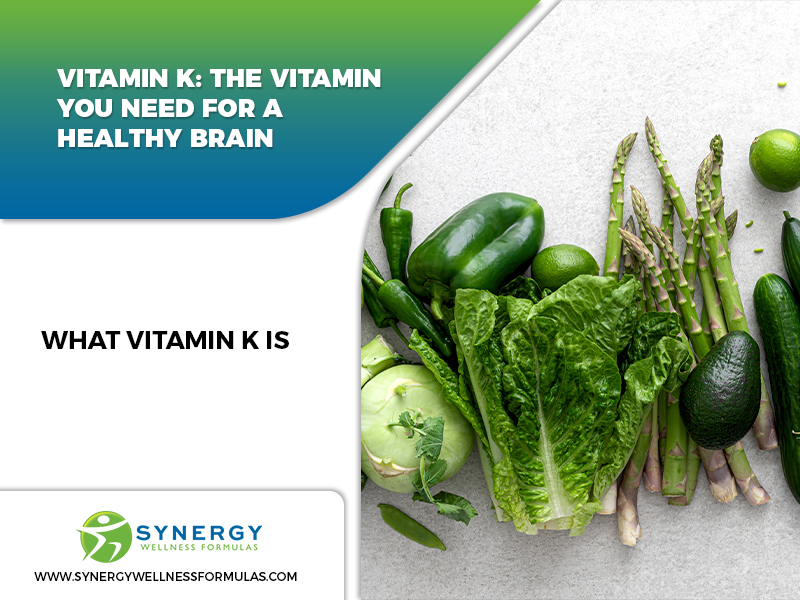
What Vitamin K Is
Vitamin K is a fat-soluble vitamin that, contrary to its numbering in the vitamin alphabet, was discovered before vitamins A and E. The “K” is derived from its initial discovery in Germany as a substance crucial for blood clotting or “koagulationsvitamin.” However, it also plays a major role in bone health and the proper functioning of certain proteins in the body.
Since the body cannot produce vitamin K on its own, it must be obtained through dietary sources, such as leafy green vegetables, dairy products, and meats. It can also be taken as a supplement to ensure sufficient intake. While a deficiency in this vitamin is rare, symptoms may include excessive bleeding or bruising easily. To maintain optimal health, make sure to include vitamin K-rich foods in your diet or talk to your doctor about supplement options.

Types Of Vitamin K
When it comes to maintaining good health, vitamin K plays a major role in blood clotting and bone health. But did you know that there are three different types of vitamin K? Vitamin K1, also known as phylloquinone, is found in plants and green vegetables. Vitamin K2, also known as menaquinone, is produced by bacteria in the intestinal tract and can also be found in some animal products.
Vitamin K3, also known as menaquinone, is a synthetic form often used in dietary supplements. While all forms of vitamin K are necessary for optimal health, it’s vital to note that too much vitamin K3 can potentially be toxic. So make sure that you’re getting your recommended daily intake through a balanced diet, and check with your doctor before taking any supplements.

Top Vitamin K Foods
When it comes to getting our daily dose of essential vitamins and minerals, most of us think about vitamin C or calcium. However, vitamin K is just as necessary for maintaining good health. Fortunately, there are many delicious options for incorporating this nutrient into our diet. Leafy green vegetables, like spinach and kale, are excellent sources of vitamin K, with one cup of raw spinach containing over 500% of the recommended daily intake. Broccoli, Brussels sprouts, and cabbage also contain significant amounts of vitamin K.
Nuts and seeds, like pine nuts, sunflower seeds, and pistachios, also provide a powerful punch of this vital vitamin. For an easy snack packed with nutrition, try a small handful of walnuts – just seven halves contains 100% of the recommended daily intake for vitamin K. By including these foods in your regular meal plan, you can easily ensure that you’re getting enough vitamin K to support optimal health.
Vitamin K Benefits
Many people are aware that vitamins are necessary for maintaining good health. But not everybody knows about the specific benefits of vitamin K. This crucial nutrient plays a major role in bone health and more.

1Vitamin K Prevents Osteoporosis
Many individuals may not be aware of the integral role played by vitamin K in bone health. Studies have shown that a vitamin K deficiency can lead to an increased risk of osteoporosis. This beneficial vitamin activates a protein called osteocalcin, which helps bind calcium to the bone matrix, leading to stronger bones.
Adequate intake of vitamin K can also lower the potential for bone fractures and improve bone density. So where can you find vitamin K? Leafy green vegetables, like spinach, kale, and broccoli, as well as fermented foods, such as miso and natto, are excellent sources. Including these ingredients in your diet may help prevent osteoporosis and support overall bone health.

2Vitamin K Aids Blood Clotting
Vitamin K is a key player in the blood clotting process. The vitamin helps the body produce proteins called prothrombin and factors VII, IX, and X, all of which play a key role in clot formation. Without enough vitamin K, these proteins are not properly produced, leading to excessive bleeding and even hemorrhaging. In addition to aiding clotting, vitamin K also helps maintain strong bones by assisting in the absorption of calcium.
Eating a balanced diet rich in leafy greens and other vitamin K-rich foods can ensure that your body has enough of this integral nutrient for proper blood clotting and bone health. It’s also crucial to note that certain medications, such as blood thinners, can interact with vitamin K levels. So it’s always best to consult with a healthcare professional before making any changes to your diet or medication regimen.
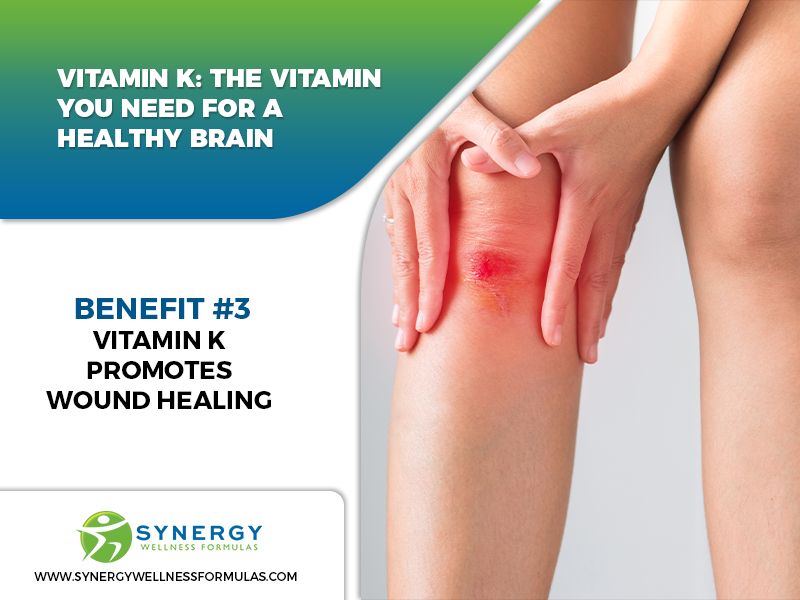
3Vitamin K Promotes Wound Healing
When it comes to healing wounds, vitamin K plays a key role. Vitamin K is known for its role in blood clotting, but it also helps with wound healing by promoting the production of proteins necessary for healthy skin and tissue regeneration. This essential vitamin can be found in leafy green vegetables and broccoli and in small amounts in dairy products.
Adequate intake of vitamin K has been found to significantly improve scar quality and decrease the overall time it takes for wounds to heal. In cases of severe trauma or surgery, a vitamin K supplement may be necessary for proper wound healing. It is important to note that certain medications can reduce the body’s absorption of vitamin K, so consulting with a healthcare provider before taking a supplement is recommended.

4Vitamin K Aids Bone Health
An integral part of maintaining strong and healthy bones is getting enough vitamin K. This vitamin helps direct calcium to the bones, which can contribute to bone density and prevent osteoporosis. In addition, vitamin K also plays a role in reducing the age-related decline in bone mineral density, making it important for both younger and older individuals.
The best sources of this crucial vitamin are dark leafy greens, like kale and spinach, as well as dairy products, such as cheese and yogurt. Ensuring that we consume enough vitamin K can greatly contribute to overall bone health and reduce fractures and breaks. So don’t skimp on those greens – eat up for stronger bones.
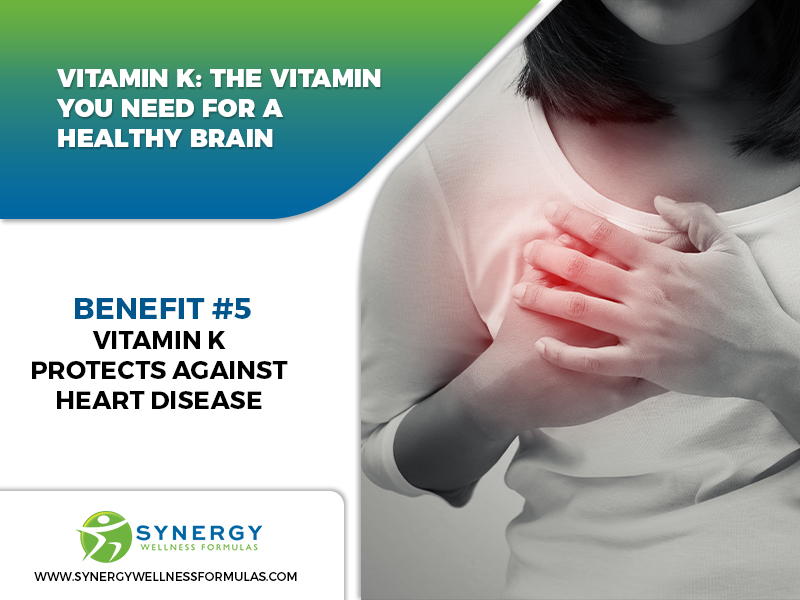
5Vitamin K Protects Against Heart Disease
Many people associate vitamins with maintaining overall health and vitality. But did you know that vitamin K can also play a role in heart health? Studies have shown that individuals with adequate levels of vitamin K are at a decreased risk of developing calcification in their coronary arteries.
Calcification is the buildup of calcium deposits in the artery walls, leading to an increased risk of heart attacks and strokes. In addition to vitamin K, leafy green vegetables, such as kale and spinach, contain high amounts of nitrates which can also help protect against artery calcification. So the next time you’re making your grocery list, be sure to add some extra leafy greens to ensure that your heart stays healthy. It’s just one more benefit of eating your veggies.

6Vitamin K Improves Insulin Sensitivity
Vitamin K, commonly known for its role in blood clotting, also has a significant impact on insulin sensitivity. Insulin resistance is a key factor in the development of Type 2 diabetes and cardiovascular disease. Studies have shown that individuals with high levels of vitamin K1 in their diet have a decreased risk of developing insulin resistance and Type 2 diabetes. Furthermore, supplementing with vitamin K2 has been shown to improve insulin sensitivity in people with existing diabetes or prediabetes.
This vitamin can be found in dark leafy greens, like spinach and kale, as well as fermented foods, like natto and pickles. Incorporating these foods into your diet may not only improve your insulin sensitivity but also provide other essential nutrients for optimal health. Additionally, vitamin K supplements may provide added benefits for those who are at risk of or already dealing with insulin resistance and Type 2 diabetes. Consult with your doctor to determine if supplementing with vitamin K is appropriate for you.
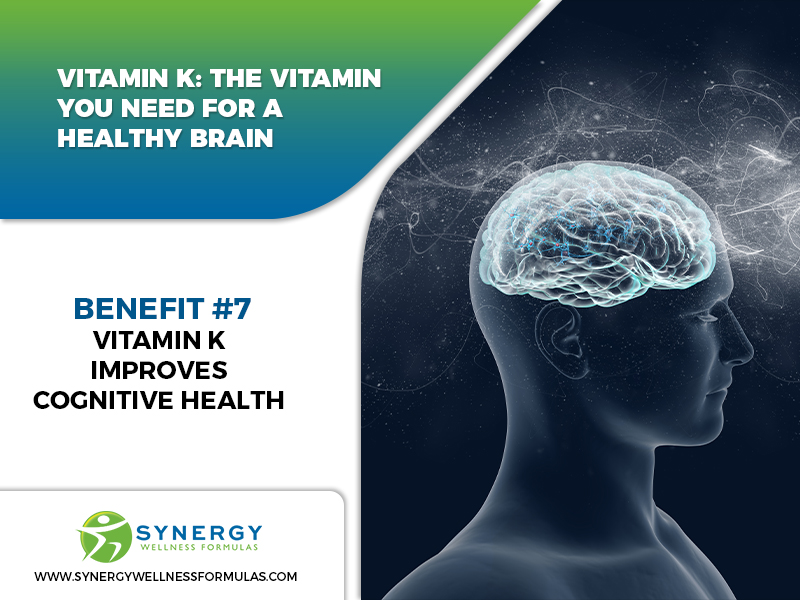
7Vitamin K Improves Cognitive Health
Many people are aware of the role vitamin K plays in blood clotting and bone health. But it may come as a surprise that this vitamin also has a significant impact on cognitive function. Numerous studies have shown that people with vitamin K deficiency have a higher risk of cognitive decline and Alzheimer’s disease.
Fortunately, incorporating more foods rich in vitamin K, such as kale, broccoli, and Brussels sprouts, into your diet can help improve cognitive health. In addition, recent research suggests that combining vitamin K with vitamins D and E may even offer protective benefits against age-related cognitive decline. So the next time you’re planning your meals, remember to add some leafy greens for their brain-boosting effects as well as their essential nutrients.
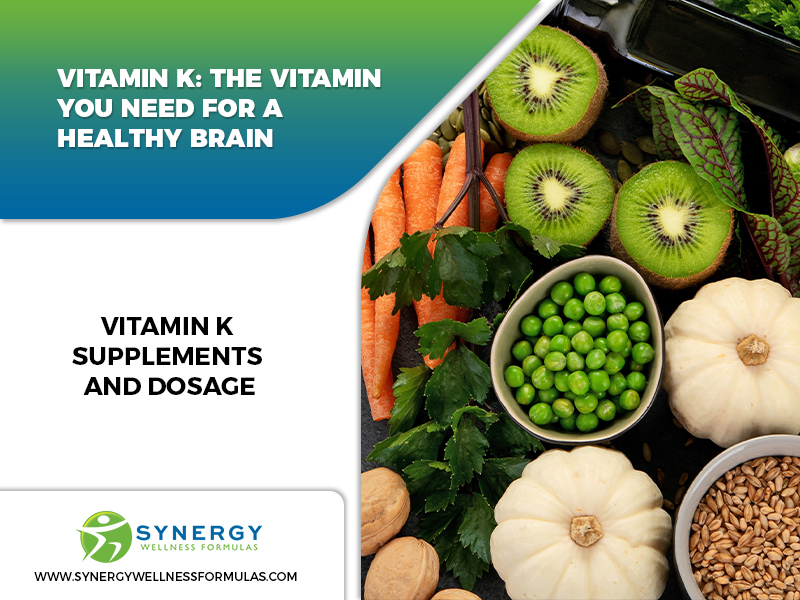
Vitamin K Supplements And Dosage
The recommended daily intake of vitamin K1 or phylloquinone is between 90 mcg and 120 mcg. It can also be found in leafy greens, broccoli, bok choy, Brussels sprouts, and cabbage. Vitamin K2, also known as menaquinone, is found in fermented foods, like natto, as well as animal products, like eggs, chicken, and beef. The recommended daily intake of vitamin K2 is between 15 mcg and 90 mcg. Vitamin K3, also known as menaquinone, is a synthetic form of vitamin K that is not recommended for human consumption due to its toxicity.
Vitamin K3 supplements should only be taken under the supervision of a healthcare provider. The best way to ensure that you are getting enough vitamin K is to eat a diet rich in leafy greens and other vegetables. However, if you are not able to get enough from diet alone, you may want Brussels sprouts and peas. Vitamin K2 or menaquinones have slightly different recommended dosages depending on the specific form – MK-4 should have a daily intake of ten mcg, while MK-7 should have a daily intake of 45 mcg.

Both are found in fermented foods, like natto and cheese. However, it’s important to note that too much vitamin K can lead to adverse side effects, such as blood clotting issues. As always, consult with your doctor before starting any new supplements to ensure the proper dosage for your specific health needs. Additionally, look for supplements made from natural sources rather than synthetic versions to ensure maximum absorption and benefits for your body. The right balance of vitamin K in your diet can lead to improved brain health and potentially lower the risk of heart disease. By keeping an eye on your daily intake and consulting with a healthcare professional, you can ensure that you’re getting the benefits of this beneficial vitamin.











